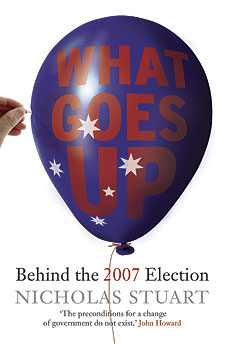The 2007 Federal Election has come and gone and Nicholas Stuart’s book, What goes up… behind the 2007 election, seeks to explore the reasons behind why the country changed government so emphatically.
Stuart doesn’t pretend that there is a single or conclusive reason for the Howard Government’s defeat, but through the book a number of possible reasons are suggested.
 It seems that Stuart is particularly convinced that the Howard years brought a significant change in the way that wealth was distributed. He suggests that whilst all are better off now economically than before Mr Howard’s rise to power, there are some who have benefited in much greater ways than others.
It seems that Stuart is particularly convinced that the Howard years brought a significant change in the way that wealth was distributed. He suggests that whilst all are better off now economically than before Mr Howard’s rise to power, there are some who have benefited in much greater ways than others.
Those who benefited least, it seems, were those known as Howard’s battlers, people who reside in the mortgage belts of major cities. It seems that it was these people more than any others that were responsible for the Howard Government’s defeat.
But Stuart makes it clear that an uneven distribution of wealth wasn’t the only issue for these people. In 2004, the Howard Government promised to keep interest rates at record lows. But interest rates rose six times between the 2004 and 2007 elections. WorkChoices (rightly or wrongly) was perceived to be an attack on Australian workers.
Stuart is of the view that Mr Howard was perceived to be out of touch with the average Australian with his sharp focus on macro-economic issues, whereas Mr Rudd’s focus on the bread and butter issues like grocery prices and petrol prices, and his willingness to appear on shows like Rove (unlike Mr Howard), gave battlers the perception that he understood where they were at.
Stuart focuses on a number of other problems that probably contributed to the Howard Government’s demise. Among these are foreign policy failures like Iraq, the leadership tensions within the Government, the Government’s slowness to accept the reality of climate change, and the perception that the Government really didn’t have a lot to offer for the future except for wads of money to carefully targeted groups that would maximise its electoral chances.
But Stuart also points out that whilst the ‘Rudd factor’ played a significant factor in the Howard Government’s demise, Australia must have been ready for Mr Rudd. Indeed, Stuart makes the point that Mr Rudd probably wouldn’t have done much better than Mr Latham in 2004 had he been the leader then.
This assessment is probably right. Whereas the Government was successful in undermining voter confidence in Mr Latham, it had no such success with Mr Rudd despite issues like the Brian Burke affair, Mr Rudd’s bullying of the media (particularly the Sunday Telegraph), the strip club incident and so on. Stuart credits Mr Rudd with the ability to use his words well to escape from such situations unscathed, but it also seems that Australians had stopped listening to the Government.
If you follow politics closely you will enjoy Stuart’s book. It flows quite well, but suffers from a lack of editorial scrutiny in some places. Stuart has obviously talked with a number of insiders and one of the valuable aspects of this book is that it provides us glimpses into the election campaign that were not available to us through the media at the time of their happening.
From a Christian point of view, reading such a book will help us to know better how we can pray for those in parliament. Stuart’s discussion of the issue of hubris at different points was a good reminder of one of the temptations that those in power face. The last chapter of the book suggests that Mr Rudd might benefit from our prayers in this regard.
This book also gives us a snapshot into how our society thinks which is helpful for us in our task of mission. It seems that we are people who struggle to be content with our lot. Even though everyone has benefited from the economic boom it seems that many turned on the Howard Government because they didn’t get as much as others. It also seems that we’re a people whose concern about our own lot in life quite easily overshadows any concern about the moral standards of those who lead us (for example, the Rudd strip club affair).
May God use the Rudd Government to bring glory to His Holy name.



















